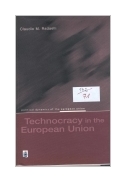(Special Offer: Discount 50% of the price)
1st Edition
Claudio M. Radaelli
1999 184 pages 0582-30493-8
(Paperback)
One of the most common and
strongest criticisms of the EU is that power is held by a select few who are unaccountable
technocrats sitting in Brussels who without consultation formulate policies.
A fresh and innovative new series, written by leading authorities, providing students and
researchers with a concise analysis of key topics relating to the state of the European
Union and its future development. Combining insights from the theoretical literature with
brief institutional descriptions, each book in the series focuses on the key questions,
'Where does power lie?', 'What are the likely scenarios for development?', thereby
enabling the reader to gain a better sense of the dynamic processes of politics at EU
level.
*Deals with a topic that is
poorly understood but which is central to understanding how the EU works
*Adopts an innovative approach to the study of the EU, which is concise and analytical
*Analyses the extent to which this is true and will introduce readers to the wide ranging
literature from political science, political sociolology and organizational behaviour on
bureaucracy, technocracy and the nature of the State to see how they help us to understand
what is going on in Brussels
*Includes three case studies on the Economic and Monetary Union, harmful tax competition
and the regulation of the media industry.
1 The themes of the book
2 From technocratic utopias to the politics of expertise 3 Technocracy and European Union
public policy-making
4 The single currency: who won at Maastricht?
5 Tax policy in the European Union: technocracy or politicization?
6 Media ownership policy: the limits of technocratic regulation (in collaboration with
Alison Harcourt)
7 Conclusions
References
Index
Księgarnia nie działa. Nie odpowiadamy na pytania i nie realizujemy zamówien. Do odwolania !.


